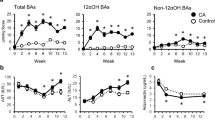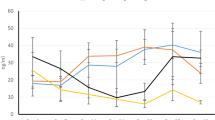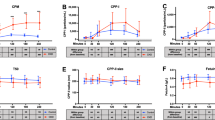Abstract
Summary: An immunoassay for rat intestinal calcium-binding protein (CaBP) employing antibody raised in chickens using purified rat intestinal CaBP has been used to measure immunoreactive CaBP in the duodenum of suckling and weanling rats. A 5-fold increase in immunoreactivity, associated with a 2 ½-fold increase in calcium-binding activity occurred at weaning, a period during which duodenal mucosal mass increased 2-fold and supernatant protein concentration increased 1 ½-fold.
Speculation: The ontogeny of calcium-binding protein in the duodenum of young rats parallels the maturation of cholecalciferol hydroxylases and represents maturation of the intestine as an end organ responsive to the vitamin D endocrine system.
Similar content being viewed by others
Log in or create a free account to read this content
Gain free access to this article, as well as selected content from this journal and more on nature.com
or
Author information
Authors and Affiliations
Rights and permissions
About this article
Cite this article
Gleason, W., Lankford, G. Intestinal Calcium-Binding Protein in the Developing Rat Duodenum. Pediatr Res 16, 403–406 (1982). https://doi.org/10.1203/00006450-198206000-00001
Issue date:
DOI: https://doi.org/10.1203/00006450-198206000-00001
This article is cited by
-
Evidence for vitamin D-independent active calcium absorption in newborn piglets
Calcified Tissue International (1993)



